#avocado nutrient absorption
Explore tagged Tumblr posts
Text
Why Avocados Are Essential for a Healthy Diet
The Superfood That Stands Out: Why Avocados Are Good for Your Health Hey there, avocado aficionado! Ever wondered why these creamy delights are all the rage? They’re not just a tasty treat; they’re like a hug for your health. From Central and South America’s kitchens to our very own, these little green wonders have made quite the journey. Let’s dive into why avocados are hailed as…
#avocado anti-inflammatory properties#avocado antioxidants#avocado for digestion#avocado for glowing skin#avocado health benefits#avocado in skincare#avocado myths debunked#avocado nutrient absorption#avocado nutrition facts#avocado recipes#avocado superfood#avocado-based meals#avocados and blood sugar control#avocados for weight loss#benefits of eating avocados#brain health benefits of avocados#choosing ripe avocados#eye health and avocados#hair benefits of avocados#healthy avocado burger#healthy fats in avocados#heart health and avocados#https://mrhealthnut.blog#skin benefits of avocados#storing avocados#sustainable avocado farming#why avocados are healthy
0 notes
Text
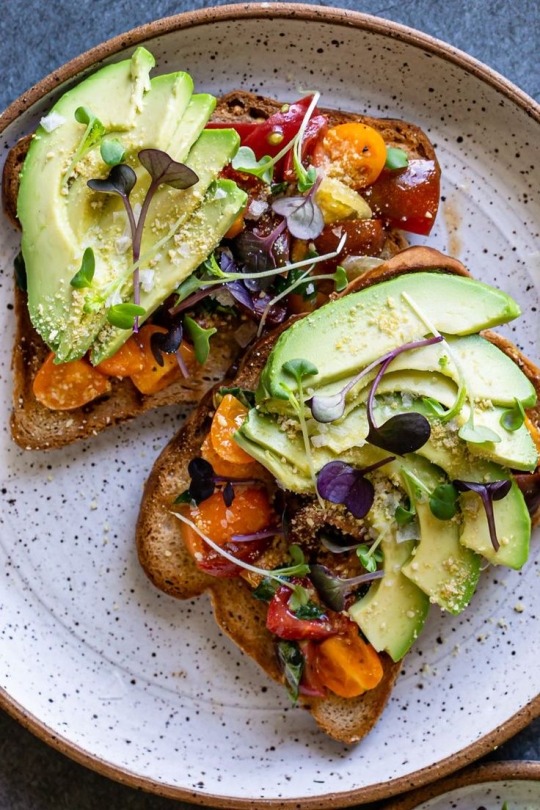
Maintaining stable blood sugar levels is essential for overall health and well-being, especially for individuals with diabetes or those at risk of developing the condition. Consuming a balanced diet that includes a variety of nutrient-dense foods can help regulate blood sugar levels and promote optimal health. Some of the best foods to eat to help maintain healthy blood sugar levels include:
1. Non-starchy vegetables: Vegetables such as leafy greens, broccoli, cauliflower, bell peppers, and zucchini are low in carbohydrates and high in fiber, vitamins, and minerals. They have a minimal impact on blood sugar levels and can help promote satiety.
2. Whole grains: Whole grains like quinoa, brown rice, oats, and whole wheat contain fiber, which slows down the absorption of glucose and helps prevent spikes in blood sugar levels. They also provide essential nutrients and energy.
3. Legumes: Beans, lentils, and chickpeas are rich in fiber and protein, which can help stabilize blood sugar levels and promote fullness. They are also a good source of vitamins, minerals, and antioxidants.
4. Lean protein: Sources of lean protein, such as poultry, fish, tofu, and legumes, can help regulate blood sugar levels and support muscle health. Protein-rich foods can help slow down the digestion of carbohydrates and prevent rapid spikes in blood sugar.
5. Healthy fats: Foods high in healthy fats, such as avocados, nuts, seeds, and olive oil, can help improve insulin sensitivity and reduce inflammation. Including healthy fats in your diet can help maintain steady blood sugar levels and support overall health.
6. Berries: Berries like blueberries, strawberries, and raspberries are low in sugar and high in fiber and antioxidants. They can be a nutritious and delicious option to satisfy sweet cravings without causing significant spikes in blood sugar levels.
7. Greek yogurt: Greek yogurt is a good source of protein and calcium, and it contains probiotics that can support gut health. Choosing plain, unsweetened Greek yogurt can help maintain stable blood sugar levels while providing essential nutrients.
Overall, focusing on a balanced diet that includes a variety of whole, nutrient-dense foods can help support healthy blood sugar levels and overall well-being. It's also important to monitor portion sizes, limit added sugars and refined carbohydrates, and stay hydrated to maintain optimal blood sugar control.
#food for thought#food fight#comfort food#fast food#healthy food#food photography#foodie#food#foodpics#foodlover#japanese food#foodmyheart#healthy salad recipes#lunch recipes#pasta recipes#pasta recipe#salad recipes#soup recipe#recipe#reciprocity#recipies#recipes#cozy autumn#cozy fall#cozyhome#cozy cozy#healhtylifestyle#healthy lunch ideas#healthy lunch#healthy diet
27 notes
·
View notes
Note
Hi, Prue! I hope you get to feel better and I hope those people with nothing to do let go of you, because honestly, it's horrible to have people bugging you so much and sucking your energy for no reason.
Regarding your post on struggling with malnutrition, I'll try to list what worked for me and what I researched about:
The first thing you need to do is start regulating your meal times — try to eat every 3 hours. They don’t have to be big meals, but they have to be nutritious. Try to eat more fruit, whether in yogurt bowls, smoothies, juices, or even fresh fruit; include more carbohydrates along with protein, such as grilled cheese, a wrap, or even vegetable protein.
Another thing is to exercise regularly, because in addition to helping with your mood, stress and nutrient absorption, it will also make you have more appetite. It can be any type of exercise, but keep in mind that it is good for your digestion and absorption of everything you eat.
Try to consume more foods with good fats, that is, nuts, olive oil, avocado, dairy products, eggs, meats, oilseeds and seeds; this helps a lot to gain more weight without compromising your health like you would by eating junk food and things like that.
Again, protein is very important, so try to include it in all your larger meals. Lean meats, eggs, dairy products, legumes, everything helps a lot, and makes you gain more muscle mass when combined with some physical exercise.
Oh, and try to make your meals interesting to you, whether it's combining new things, testing recipes or looking for new options, you have to make it something fun for you, not just a task, no matter how important it is, if it's like an obligation, at some point you'll feel discouraged.
It would be good if you talked to your mother, because you may have some problem affecting your appetite, and if you do some tests, maybe this can be fixed, you could also go to a nutritionist. But, if you don't feel comfortable with this, that's okay, try to see if your weight changes just by changing your routine, I wish you luck!!
thank you thank you thank you this is great !! 🙏🏼🙏🏼
4 notes
·
View notes
Text
Unleashing the Flavor: Unconventional Vegan Smoothie Recipes
Smoothies can be enjoyed all year round, not just during hot summer days. When you think of vegan smoothies, fruits and leafy greens usually come to mind. However, many unconventional ingredients can elevate your smoothie experience. In this post, we will explore unique roots, spices, and seeds that can transform ordinary smoothies into vibrant concoctions packed with flavor and nutrition. Get ready to try these unexpected vegan smoothie recipes that will delight your taste buds and provide a nourishing health boost.
The Rise of Unconventional Ingredients
The health food scene has changed dramatically with the rise of unconventional ingredients. Items like beets, turmeric, maca powder, and avocados are now staples, each offering numerous benefits. For instance, beets are known for their ability to enhance blood flow, while turmeric boasts anti-inflammatory properties.
These ingredients not only bring unique flavors but also very high nutritional value. For example, one cup of cooked beets provides about 58 calories along with 2.2 grams of protein and a significant dose of folate.
As you explore these smoothie recipes, remember that balancing flavors and ensuring all ingredients work well together is key to crafting the perfect smoothie.
Recipe 1: Beet and Berry Bliss
Beets are vibrant and earthy, while berries add sweetness. Together, they create a nutrient-rich smoothie.
Ingredients:
1 small cooked beet, peeled and diced
1 cup mixed berries (fresh or frozen)
1 banana
1 cup almond milk (or any plant-based milk)
1 tablespoon chia seeds
1 teaspoon maple syrup (optional)
Instructions:
Combine all ingredients in a blender.
Blend on high until smooth and creamy.
Adjust sweetness with maple syrup, if desired.
Serve immediately and enjoy this colorful, nutrient-packed drink!

The sweetness of the mixed berries perfectly balances the earthiness of the beets, resulting in a tasty and visually stunning smoothie.
Recipe 2: Tropical Turmeric Sunshine
Turmeric is well-known for its anti-inflammatory benefits. Combined with tropical fruits, this smoothie will take you to a warm beach.
Ingredients:
1 cup coconut water
1 banana
1 cup pineapple chunks (fresh or frozen)
1 teaspoon ground turmeric
1 tablespoon hemp seeds
A pinch of black pepper (to enhance turmeric absorption)
Instructions:
Add all ingredients to a blender.
Blend until smooth and creamy.
Pour into a glass and enjoy the tropical flavors!

This refreshing smoothie is not only delicious but also offers a rich dose of turmeric.
Recipe 3: Creamy Avocado Dream
Avocado is not just for toast; it brings a creamy texture and healthy fats to smoothies, making this recipe both indulgent and nutritious.
Ingredients:
1 ripe avocado
1 banana
1 cup spinach
1 cup oat milk (or any plant-based milk)
1 tablespoon agave syrup (optional)
Instructions:
Scoop out the avocado and add it with the other ingredients in a blender.
Blend until you achieve a velvety smooth texture.
Sweeten with agave syrup if desired and serve immediately.
The creamy consistency of avocado, combined with the banana's slight sweetness, makes for a luxurious smoothie.
Recipe 4: Spicy Ginger Green
Ginger adds a spicy kick and digestive benefits to your smoothies. Paired with greens and fruits, this smoothie is as refreshing as it is invigorating.
Ingredients:
1 cup kale or spinach
1 small piece of fresh ginger, peeled
1 green apple, cored and chopped
1 banana
1 cup coconut milk
Juice of 1/2 lemon
Instructions:
Add all ingredients to your blender.
Blend on high until smooth and well combined.
Taste and adjust sweetness with another apple or banana if necessary.
The sharpness of ginger is balanced by the sweetness of the fruits, making this smoothie a great choice to kickstart your day.
Recipe 5: Maca Vanilla Delight
Maca powder is a powerful superfood that can boost your energy. This smoothie is a sweet and nutritious treat that combines vanilla and banana flavors.
Ingredients:
1 banana
1 tablespoon maca powder
1 teaspoon vanilla extract
1 cup almond milk
1 tablespoon almond butter
Instructions:
Place all ingredients into the blender.
Blend thoroughly until silky smooth.
Serve chilled for a refreshing energy boost.
Maca introduces a unique, nutty flavor to this smoothie, enriching both its taste and nutritional content.
Practical Tips for Crafting Unique Smoothies
Experiment with flavors: Be open to mixing unconventional ingredients to discover your favorite combinations.
Balance textures: Pair creamy ingredients, like avocado or nut butters, with watery ones, like cucumbers or coconut milk, for a pleasant texture.
Incorporate spices and herbs: Use fresh herbs like mint or spices like cinnamon to enhance flavors without adding calories.
Boost your nutrition: Add seeds like chia, flax, or hemp for a dose of omega-3 fatty acids and fiber.
Use seasonal ingredients: Choose seasonal fruits and vegetables to enjoy the best flavor and freshness.
Final Thoughts
Smoothies are an excellent way to include a range of fruits, vegetables, and superfoods in your diet. By trying out unconventional ingredients, you can create unique recipes that taste fantastic and deliver a wealth of nutrients.
Feel free to customize these recipes to your taste and embrace the adventure of trying something new. Whether you seek a meal replacement, a post-workout snack, or a refreshing drink, these unconventional vegan smoothie recipes can inspire culinary creativity in your kitchen.
So grab your blender, gather your ingredients, and blend your way to a healthier, tastier life!
2 notes
·
View notes
Text
Nutrition and Wellness: Separating Fact from Fiction
In the age of social media influencers, fad diets, and self-proclaimed well-being authorities, it’s more difficult than ever to separate nutrition data from fiction. Misinformation spreads quick, frequently packaged in aesthetically alluring posts or sensational headlines. While some pointers and traits are rooted in technological know-how, many aren't—and they can do extra damage than top. In this newsletter, we’ll dive into commonplace myths surrounding nutrients and well being and highlight what the technological know-how definitely says.
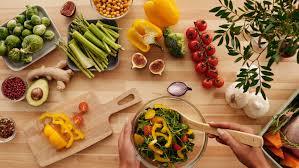
separating nutrition facts from fiction"
Myth #1: Carbs Are Bad for You
Fiction: Carbohydrates make you gain weight and should be averted.
Fact: Carbohydrates are a number one supply of power for your body and mind. Not all carbs are created same, and the secret is distinguishing between simple and complicated carbohydrates.
Simple carbs (like delicate sugars in sweet or white bread) can spike blood sugar and contribute to weight benefit if consumed excessively.
Complex carbs (like entire grains, culmination, and greens) provide fiber, nutrients, and lengthy-lasting power.
In fact, entire grains and fiber-rich foods were associated with lower dangers of coronary heart ailment, kind 2 diabetes, and obesity. Carbs handiest end up difficult whilst consumed in extra or whilst sourced from fantastically processed ingredients.
Myth #2: You Need to Detox Your Body with Juice Cleanses
Fiction: Juice cleanses flush out pollutants and reset your body.
Fact: Your body already has an extremely effective detox machine—your liver, kidneys, skin, and lungs. There's no medical proof that juice cleanses or detox teas enhance this natural manner. In truth, excessive cleanses can lead to nutrient deficiencies, blood sugar imbalances, and digestive issues.
While juices may be nutrient-dense if crafted from complete end result and vegetables, they regularly lack fiber and are high in sugar. A better approach? Support your frame with a balanced food regimen, hydration, normal workout, and sleep.
Myth #3: Fat Makes You Fat
Fiction: Eating fat causes weight advantage.
Fact: Dietary fat is critical for fitness. It helps mobile increase, hormone production, and nutrient absorption. What matters most is the form of fats you consume.
Healthy fats (monounsaturated and polyunsaturated fat located in avocados, nuts, seeds, and fatty fish) can lessen irritation and decrease the danger of coronary heart disorder.
Unhealthy fats (trans fats and excessive saturated fat) can make a contribution to cardiovascular problems and need to be constrained.
Eating fat moderately as part of a balanced weight-reduction plan does no longer immediately cause weight advantage—in reality, healthy fats can boom satiety and assist adjust urge for food.
Myth #four: High-Protein Diets Are Dangerous
Fiction: Eating too much protein harms your kidneys and bones.
Fact: For most healthful individuals, a high-protein weight-reduction plan is not harmful. This fable likely originated from research in human beings with preexisting kidney disease, for whom excessive protein consumption can be dangerous. But in wholesome individuals, there’s no strong evidence that a high-protein food plan causes kidney harm.
Protein plays a key position in muscle repair, immune feature, and hormone manufacturing. It's specially critical for active individuals, older adults, and those looking to lose fats while keeping lean muscle mass.
That stated, "high-protein" doesn't mean all-meat diets. Good protein sources encompass legumes, dairy, eggs, hen, fish, and plant-primarily based options like tofu and quinoa.
Myth #5: Natural or Organic Means Healthy
Fiction: If it’s labeled “natural” or “natural,” it ought to be excellent for you.
Fact: Labels may be misleading. "Natural" is a loosely regulated time period and doesn’t assure a product is unfastened from preservatives, introduced sugars, or dangerous fat. Similarly, "organic" refers to how components are grown (without artificial pesticides or fertilizers), not to the product’s dietary fee.
For instance, organic cookies might also nonetheless be loaded with sugar and energy. Always study the vitamins label and elements list as opposed to counting on advertising buzzwords.
Myth #6: You Should Eat Small Meals Every 2–three Hours
Fiction: Frequent consuming boosts metabolism and enables with weight reduction.
Fact: While some humans do nicely with frequent meals, there may be no customary gain to eating each 2–three hours. Your metabolism does not appreciably speed up with extra frequent eating.
What’s extra essential is general calorie intake and meals nice over the direction of the day. For a few, intermittent fasting or 3 balanced food an afternoon is probably extra sustainable and beneficial, specially for urge for food control and blood sugar law.
Myth #7: Supplements Can Replace Food
Fiction: Taking nutrients and supplements is simply as top as ingesting nutrient-wealthy ingredients.
Fact: Supplements may be useful, mainly for filling unique dietary gaps (like diet D in winter or B12 for vegans). But they are able to’t fully mirror the complexity of whole meals, which give a synergistic blend of fiber, antioxidants, and phytochemicals.
Relying totally on dietary supplements can deliver a false sense of safety and might even lead to nutrient imbalances or toxicities if overused. Whenever possible, prioritize entire, minimally processed meals.
Myth #8: You Must Be Perfect to Be Healthy
Fiction: One dangerous meal or missed workout ruins your development.
Fact: Consistency beats perfection. A healthy lifestyle isn’t about never indulging—it is approximately developing sustainable conduct that support your well-being through the years. One meal or one lazy day won’t undo weeks or months of proper selections.
Allowing flexibility in your ordinary promotes a more healthy relationship with meals and motion. Mental well-being is a part of the photo, too, and stressing over perfection can cause burnout, disordered eating, or anxiety.
Evidence-Based Wellness Tips
Now that we’ve busted some common myths, right here are a few actionable, evidence-subsidized pointers to assist nutrition and typical wellbeing:
Eat quite a few entire meals: Include veggies, fruits, entire grains, lean proteins, and wholesome fat.
Stay hydrated: Water is important for metabolism, digestion, and energy.
Get enough sleep: Aim for 7–9 hours in line with night to aid hormone balance, urge for food regulation, and recovery.
Move your frame frequently: Exercise facilitates lessen stress, enhance temper, and help cardiovascular and metabolic fitness.
Limit ultra-processed meals: These regularly incorporate excessive quantities of brought sugar, sodium, and bad fats.
Practice mindful eating: Pay attention to hunger and fullness cues, and enjoy meals without distractions.
Manage pressure: Chronic strain can negatively have an effect on digestion, appetite, and irritation.
Benefits Of Meditation
Immediate Benefits Of Plant Based Diet
2 notes
·
View notes
Text
How Diet Impacts Digestive Health and Foods to Avoid for Comfort
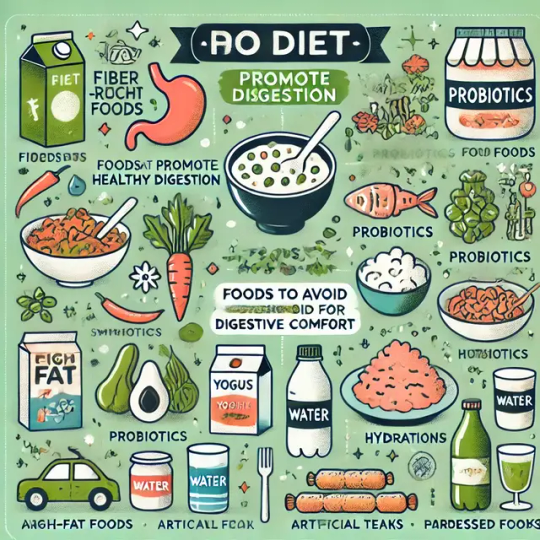
Diet plays a pivotal role in maintaining digestive health, influencing everything from nutrient absorption to gut microbiome balance. The foods we eat can either support smooth digestion or trigger discomfort like bloating, gas, and indigestion. Understanding how different foods affect your gut can help you make informed choices to prevent digestive distress.
How Diet Affects Digestion
Fiber :
Soluble fiber (oats, apples) absorbs water, softening stools and aiding regularity.
Insoluble fiber (whole grains, vegetables) adds bulk, promoting bowel movements.
Caution : Too much fiber too quickly can cause gas and cramping.
Fats :
Healthy fats (avocados, olive oil) lubricate the intestines.
Saturated and trans fats (fried foods, processed snacks) slow digestion, leading to bloating and reflux.
Proteins :
Lean proteins (fish, tofu) are easily digested.
Fatty cuts of meat or overcooked proteins strain digestion.
Sugars and Sweeteners :
Simple sugars (sodas, candies) ferment in the gut, causing gas.
Artificial sweeteners (sorbitol, aspartame) are linked to diarrhea and bloating.
Foods to Avoid for Digestive Comfort
High-FODMAP Foods (Trigger bloating and gas):
Examples : Beans, lentils, onions, garlic, wheat, and certain fruits (apples, mangoes).
Why? Fermentable carbs that gut bacteria break down, producing gas.
Dairy for the Lactose Intolerant :
Avoid : Milk, cheese, ice cream.
Alternative : Lactose-free options or plant-based milks.
Gluten-Containing Grains (For those with sensitivity or celiac disease):
Avoid : Wheat, barley, rye.
Choose : Gluten-free alternatives like quinoa or rice.
Fried and Fatty Foods :
Examples : French fries, fried chicken, creamy sauces.
Why? Slow stomach emptying, increasing reflux and indigestion risk.
Processed and Spicy Foods :
Examples : Chips, hot sauces, chili peppers.
Why? Additives and capsaicin irritate the gut lining.
Carbonated Beverages :
Examples : Sodas, sparkling water.
Why? Trapped gas expands the stomach, causing bloating.
Alcohol and Caffeine :
Effects : Dehydrate the body, relax the esophageal sphincter (causing reflux), and irritate the stomach.
Artificial Sweeteners :
Examples : Sugar-free gum, diet sodas.
Why? Poorly absorbed, leading to diarrhea and gas.
Foods to Embrace for a Healthy Gut
Fermented Foods : Yogurt, kimchi, sauerkraut (rich in probiotics).
Gentle Fibers : Oats, bananas, cooked vegetables (easily digestible).
Lean Proteins : Chicken, turkey, tofu.
Herbal Aids : Ginger (reduces nausea), peppermint (eases spasms).
Hydration : Water and herbal teas support digestion.
Practical Tips for a Gut-Friendly Diet
Eat Mindfully : Chew thoroughly and avoid overeating to reduce gas.
Keep a Food Diary : Track triggers and symptoms to identify patterns.
Cook Smart : Steam, grill, or bake instead of frying.
Stay Hydrated : Water aids fiber absorption and prevents constipation.
When to Seek Help
Consult a healthcare provider if symptoms persist despite dietary changes, or if you experience:
Chronic pain, blood in stool, unexplained weight loss, or difficulty swallowing.
Conclusion
Your diet is a powerful tool for managing digestive health. By avoiding common triggers and incorporating gut-friendly foods, you can reduce discomfort and support a thriving microbiome. Experiment with elimination diets or consult a dietitian to personalize your approach. Remember, a happy gut is the foundation of overall well-being! more
#beauty#health & fitness#mental health#fitness#health and wellness#healthylifestyle#healthcare#supliments#acne#bodybuilding
2 notes
·
View notes
Text
Basic Health Guide
• Basic Health Information:
your Essential Guide to Well- Being :Health is undoubtedly the greatest asset one can possess, forming the foundation of a fulfilling and meaningful life. It goes beyond merely avoiding illness; true health embodies the harmony of the body, mind, and soul. In today’s fast-paced and often stressful world, where lifestyle diseases and mental health issues are on the rise, understanding the basics of health has never been more important. This guide explores the essence of health, its core principles, and practical steps to achieve and maintain it.
• What is Health?
Health is far more than the absence of disease. According to the World Health Organization (WHO), health is defined as a “state of complete physical, mental, and social well-being.” This implies that a truly healthy individual is one who enjoys a balanced state of physical fitness, mental tranquility, and social harmony.
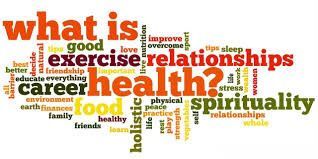
https://youtu.be/CDY0EYk1FdQ?si=tA0WMCTqDz_-Tvxq
For instance, someone who exercises daily but struggles with chronic stress may not be considered healthy in the broader sense. True health requires equal attention to physical vitality, emotional resilience, and a supportive social environment.
• Basic Principles of Health
To live a vibrant and balanced life, it is essential to adhere to certain universal health principles. Let’s delve into these with practical examples:
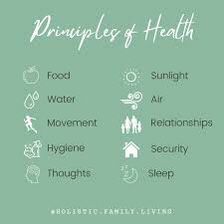
https://youtube.com/shorts/fruRm91r1Ik?si=SVm89P7vNLkOOKRy
• Balanced Diet:
A well-balanced diet provides the fuel your body needs to function optimally. It should include essential nutrients such as proteins (for muscle repair), carbohydrates (for energy), healthy fats (for brain health), and vitamins and minerals (to strengthen immunity).
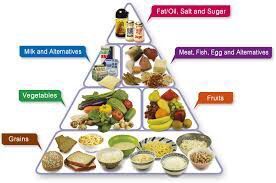
For example, a balanced breakfast might include scrambled eggs for protein, whole-grain toast for carbohydrates, an avocado slice for healthy fats, and a glass of orange juice for Vitamin C. Avoiding processed foods and excessive sugar further enhances overall health.
https://youtu.be/NqV1Ig4_nfI?si=iy3ci69fvio_VNqt
• Regular Exercise:
Physical activity is a cornerstone of good health, benefiting not only the body but also the mind. Engaging in at least 30 minutes of exercise daily—whether it's brisk walking, running, swimming, or yoga—helps improve cardiovascular health, boost mood, and reduce stress.
For instance, taking a 20-minute walk after dinner can aid digestion and calm the mind, while practicing yoga can help alleviate anxiety and improve flexibility.
https://youtu.be/qTHVnGA5rzU?si=9WzIbPN1S27ZWuwU
• Adequate Sleep:
Sleep is the body’s natural repair mechanism. Adults should aim for 7-8 hours of restful sleep each night. Poor sleep habits can lead to fatigue, irritability, and even chronic conditions such as hypertension.
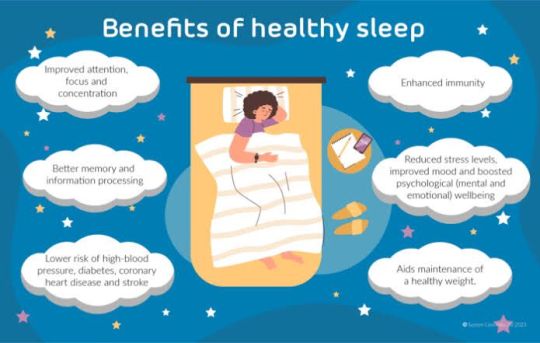
Imagine the difference between starting your day after a good night’s sleep versus one spent tossing and turning. Proper rest not only keeps you energized but also sharpens focus and memory.
https://youtu.be/cjlhbYiynq4?si=2BPn5snxSh8HycNO
• Water Intake:
Staying hydrated is vital for maintaining bodily functions, from regulating temperature to aiding digestion and nutrient absorption. Drinking 8-10 glasses of water daily is recommended, though needs may vary based on activity levels and climate.

For example, on hot summer days or after an intense workout, increasing water intake is crucial to replenish lost fluids and prevent dehydration.
https://youtube.com/shorts/dw1mdzdprfY?si=q2HCDoyZYNVviLNR
• Mental Peace:
Mental well-being is equally important as physical health. Chronic stress, if unchecked, can manifest as headaches, high blood pressure, or even depression. Practices such as mindfulness meditation, engaging in hobbies, or spending quality time with loved ones can significantly reduce stress levels.
For instance, setting aside 15 minutes daily for meditation can help clear the mind, while nurturing relationships through meaningful conversations fosters emotional stability.
• Preventing Diseases:
Prevention is always better than cure, and taking proactive steps can protect you from many common diseases. Here are some essential preventive measures:
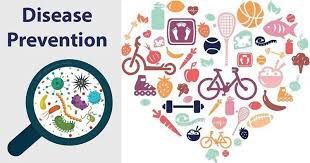
1.Washing Hands:Regularly washing your hands with soap can prevent the spread of infectious diseases such as colds, flu, and COVID-19. For example, washing hands before meals and after visiting public places is a simple yet effective habit.
2.Vaccination: Staying up-to-date with vaccinations can shield you from serious illnesses like measles, influenza, and hepatitis. For instance, flu shots during the winter season can significantly reduce the risk of infection.
3.Sun Exposure: Moderate exposure to sunlight, especially in the morning, is a natural way to boost Vitamin D levels, which strengthens bones and improves immunity. A 15-minute walk in the early sunlight can make a huge difference.
• Health Care:
Routine health check-ups and early diagnosis are vital for addressing potential health issues before they escalate. Visiting a doctor regularly, even when you feel fine, helps monitor blood pressure, sugar levels, and cholesterol.
For example, someone with a family history of diabetes should undergo periodic blood sugar tests to catch early signs and take preventive measures like dietary adjustments or increased physical activity.
Additionally, recognizing symptoms such as persistent fatigue, unexplained weight loss, or chronic pain and seeking timely medical attention can prevent serious complications.
• Conclusion:
Health is the cornerstone of happiness and success. A healthy body and mind enable you to pursue your goals, maintain relationships, and lead a life full of vitality and purpose. By adopting simple habits like eating a balanced diet, staying active, prioritizing sleep, and practicing mindfulness, you can significantly improve your quality of life. Remember, your health is your most valuable investment—nurture it every day to enjoy a long, fulfilling life.
2 notes
·
View notes
Text
👀Must Know: Nutrition Tips and Tricks 🥗🍽️
📌 Today, we're into must-know nutrition tips and tricks. Good nutrition is the base of a healthy life! Let's get into how you can make the most of your diet. ⬇️
1️⃣ Tip 1: Include Whole Foods
Whole foods like fruits, vegetables, whole grains, and lean proteins are full of nutrients. Unprocessed foods give you the vitamins, minerals, and antioxidants your body needs to function correctly. Eating whole foods reduces your intake of added sugars, unhealthy fats, and preservatives. Whole foods are naturally lower in calories and higher in fiber, which helps you maintain a healthy weight and digestive health.
2️⃣ Tip 2: Understand Macronutrients
Balance your macronutrients: carbohydrates, proteins, and fats. Carbs give you energy, proteins support muscle repair and growth, healthy fats support hormone production and brain health. Aim for a balanced plate at every meal. Carbs should come from whole grains, fruits, and veggies. Choose lean proteins like chicken, fish, beans, and legumes. Incorporate healthy fats from nuts, seeds, and avocados. This balance gives you sustained energy and overall health.
3️⃣ Tip 3: Incorporate Micronutrients
Micronutrients like vitamins and minerals are important for many bodily functions. Make sure you have a diverse diet to get a variety of micronutrients. Leafy greens, nuts, seeds, and colorful fruits are excellent sources. Vitamin C from citrus fruits supports the immune system, calcium from dairy products strengthens bones, and iron from spinach and lentils prevents anemia. A varied diet covers all your nutritional bases.
4️⃣ Tip 4: Hydrate
Stay hydrated! Water is for digestion, nutrient absorption, and toxin elimination. Aim for at least 8 glasses of water a day. You can also include herbal teas and water-rich fruits like watermelon and cucumber. Hydration is good for skin, weight management, and physical performance. Carry a water bottle with you and stay hydrated throughout the day. Listen to your body and drink when you're thirsty.
5️⃣ Tip 5: Fiber is Your Best Friend
Fiber is for digestion, weight management, and chronic disease prevention. Incorporate soluble and insoluble fiber from oats, beans, fruits, and veggies. Soluble fiber from oats and beans helps control blood sugar and lower cholesterol. Insoluble fiber from whole grains and veggies helps with bowel regularity. A fiber-rich diet is good for your gut microbiome.
6️⃣ Tip 6: Limit Processed Foods
Processed foods contain unhealthy fats, sugars, and sodium, which can lead to obesity, heart disease, and diabetes. Opt for whole, natural foods whenever possible. Cooking at home allows you to control the ingredients and avoid additives. Read food labels to make informed choices. Reducing processed food intake means better long-term health outcomes.
7️⃣ Tip 7: Eat Mindfully
Be mindful by paying attention to your hunger and fullness cues; eat slowly and savor each bite. This helps with digestion and prevents overeating. Mindful eating enables you to enjoy your food more and recognize true hunger vs emotional eating. It helps you make healthier food choices and the eating experience. Put away distractions and focus on your meal.
8️⃣ Tip 8: Plan and Prep
Meal planning and prepping help you eat balanced. Set aside time each week to plan your meals, grocery shop, and prep ingredients. This saves time and ensures you have healthy options available. Planning reduces the temptation to grab unhealthy convenience foods. Batch cooking and storing meals make busy days easier and consistent healthy eating. Make a grocery list to avoid impulse buys.
➡️ These tips will make a big impact. Remember, consistency is key. Small changes add up over time.
📌 P.S. For more nutrition tips and tricks, consider joining my newsletter. 📬📬 https://marcomarconii.ck.page/18360dce95
3 notes
·
View notes
Text
How to Become a Bodybuilder with>> "Bulk Extreme"<<2024
Are you ready to build serious muscle, increase strength, and transform your body? Bulk Extreme is the supplement designed to help you achieve your bodybuilding goals faster and more efficiently. Here's how you can use this product to maximize muscle gains and become a bodybuilder.
1. Set Your Bodybuilding Goals
To get started on your bodybuilding journey, set clear goals for muscle growth, strength improvement, and overall physique transformation. Whether you want to bulk up, add lean muscle mass, or increase your endurance, having a structured plan is essential.
Bulk Extreme is designed to support these goals by:
Boosting muscle growth naturally
Increasing testosterone levels for enhanced performance
Reducing recovery time so you can train more frequently
👉 👉 Click here to buy Bulk Extreme
2. Follow a Structured Workout Plan
Building muscle requires a combination of the right exercises and progressive overload. This means you’ll need to continuously challenge your muscles by increasing the weight, reps, or intensity over time. Here’s a basic outline of an effective bodybuilding workout routine:
Muscle-Building Exercises:
Squats: Target your legs and core
Deadlifts: Strengthen your entire posterior chain (back, glutes, hamstrings)
Bench Press: Build your chest, shoulders, and triceps
Pull-Ups: Develop your back and biceps
How Bulk Extreme Helps: This supplement enhances your energy and stamina, helping you push through intense workouts. It also supports muscle endurance, allowing you to lift heavier weights and perform more reps, leading to faster gains.
3. Optimize Your Nutrition for Muscle Growth
Diet plays a crucial role in bodybuilding success. You need to fuel your body with the right nutrients to grow muscle and recover properly. Here’s how to structure your diet:
Protein: Essential for muscle repair and growth. Aim for 1.6 to 2.2 grams of protein per kilogram of body weight. Good sources include lean meat, fish, eggs, and protein shakes.
Carbohydrates: Provide energy for your workouts. Stick to complex carbs like sweet potatoes, brown rice, and oats.
Healthy Fats: Support hormone production and overall health. Include sources like avocados, nuts, and olive oil.
How Bulk Extreme Helps: It aids in muscle protein synthesis, meaning the protein you consume is more effectively used to build muscle. Additionally, Bulk Extreme improves nutrient absorption, so your body gets the most out of the food you eat.
👉 👉 Click here to buy Bulk Extreme
4. Boost Testosterone for Muscle Growth
Testosterone is a key hormone in building muscle, improving strength, and increasing energy levels. As you progress in bodybuilding, it’s important to maintain optimal testosterone levels. Bulk Extreme naturally boosts testosterone, providing benefits such as:
Increased muscle mass
Enhanced workout performance
Faster recovery and reduced fatigue
This makes it easier to achieve your muscle-building goals more quickly.
5. Prioritize Recovery
Muscle growth happens during rest and recovery, not just during workouts. To ensure your muscles repair and grow after intense training, make sure to get 7-9 hours of sleep each night and take regular rest days.
Bulk Extreme helps with faster muscle recovery by reducing post-workout soreness, allowing you to get back to the gym sooner and train harder.
6. Stay Consistent
Consistency is the key to bodybuilding success. Take Bulk Extreme daily as recommended, and combine it with a balanced diet and structured workout plan to see the best results. Over time, you’ll notice improvements in muscle size, strength, and definition.
Achieve Your Dream Physique with Bulk Extreme
By incorporating Bulk Extreme into your bodybuilding journey, you’ll supercharge your muscle growth, improve your workout performance, and accelerate your progress. Whether you’re a beginner or an experienced lifter, this supplement will help you reach your muscle-building goals.
Ready to Get Started? Make your bodybuilding journey faster and more effective with Bulk Extreme.
👉 👉 Click here to buy Bulk Extreme
#How to Become a Bodybuilder#How to Become a Bodybuilder with>> “Bulk Extreme”<<2024#Bulk Extreme#Bulk Extreme Review#bulk extreme product#gym#health & fitness#bodybuilding#home & lifestyle#workout#nature#art#diy#black stories
4 notes
·
View notes
Text
Foods for Cancer Patients with No Appetite
Cancer treatments often lead to a decreased appetite, making proper nutrition challenging. Maintaining adequate nutrition is crucial for supporting overall health and recovery. Here are some effective strategies and nutrient-dense foods to help cancer patients with low appetites.
How Cancer Affects Appetite:
Nausea and Vomiting: Common side effects that make eating difficult.
Changes in Taste and Smell: Treatments can alter food preferences.
Fatigue: Reduces energy for meal preparation and eating.
Mouth Sores: Painful sores can hinder eating.
Digestive Issues: Bowel changes can impact appetite and nutrient absorption.
Importance of Nutrition:
Maintains Strength and Energy: Supports daily activities.
Supports Immune Function: Helps fight infections.
Promotes Healing: Aids in recovery and tissue repair.
Manages Side Effects: Certain foods can alleviate symptoms.
Improves Quality of Life: Enhances mood and overall well-being.
Nutrient-Dense Foods:
Protein-Rich Foods: Eggs, Greek yogurt, tofu, tempeh, beans, and lentils.
Healthy Fats: Avocado, nuts, seeds, olive oil, coconut milk, and nut butters.
Complex Carbohydrates: Whole grains, legumes, fruits, vegetables, sweet potatoes, and whole grain bread.
Strategies to Improve Appetite:
Small, Frequent Meals: Less overwhelming and easier to manage.
Enhance Flavor and Texture: Use spices, try different cooking methods, and serve at room temperature.
Stay Hydrated: Drink water, herbal teas, and eat hydrating foods like watermelon and oranges.
Maintaining nutrition is essential for cancer patients, even with a reduced appetite. Consult a healthcare provider or dietitian for personalized advice.
Read the full blog here.
#cancer#immune deficiency disorders#lymphoma#multiple myelomas#platelet disorders#leukemia#sickle cell anemia#thalassemia#blood clotting#malignant disorders#aplastic anemia#blood cancer treatment in india#cancer survivor#foods for cancer patients
4 notes
·
View notes
Text
You Won't Believe These Nutrition Myths
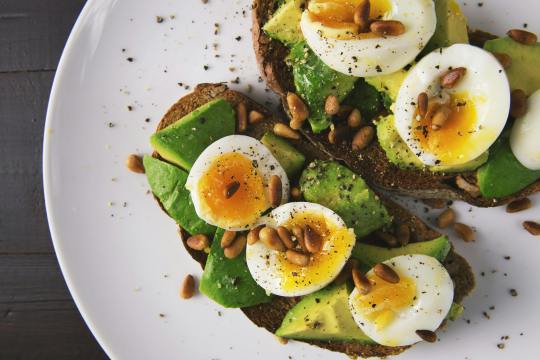
Are you tired of falling for diet fads and nutrition nonsense? You're not alone. The world of health and wellness is filled with misinformation, and it can be tough to separate fact from fiction. Today, we're busting some of the most common nutrition myths that have been circulating for far too long.
Myth #1: Skipping Breakfast Boosts Weight Loss
Let's start with a classic: skipping breakfast to shed those pounds. While it might seem counterintuitive, your body needs fuel to function optimally, even in the morning. Skipping breakfast can lead to overeating later in the day and slow down your metabolism. Instead, opt for a balanced meal rich in protein, fiber, and healthy fats to kick-start your day.
Myth #2: Carbs Are the Enemy
Carbs have gotten a bad rap over the years, but they're essential for energy and brain function. The key is choosing the right kind of carbs. Complex carbs found in whole grains, fruits, and vegetables provide sustained energy, while refined carbs (like white bread and sugary drinks) should be limited.
Myth #3: Fat Makes You Fat
This one is a real head-scratcher. Healthy fats are crucial for hormone production, nutrient absorption, and overall well-being. It's the unhealthy fats, like those found in processed foods, that you should be limiting. Incorporate sources of healthy fats like avocados, nuts, seeds, and olive oil into your diet.
Myth #4: Juicing is a Health Elixir
While juicing can be a way to consume fruits and vegetables, it's important to remember that you're losing fiber in the process. Fiber is essential for digestion and satiety. Whole fruits and vegetables provide a better balance of nutrients and keep you feeling fuller for longer.
Myth #5: Gluten-Free is Healthier for Everyone
Gluten-free diets are necessary for people with celiac disease, but they're not inherently healthier for everyone else. Many gluten-free products are processed and high in sugar and unhealthy fats. If you don't have celiac disease or a gluten sensitivity, there's no need to eliminate gluten from your diet.
Remember: It's always best to consult with a registered dietitian or healthcare professional for personalized nutrition advice. By debunking these common myths, you can make informed choices about your diet and overall health.
What other nutrition myths have you heard? Share your thoughts in the comments below!
2 notes
·
View notes
Text
Anti-inflammatory diet - being in charge of our own health
I've been following an anti-inflammatory diet for almost a month.
I did expenses recently and was happy I did not eat out a lot recently. I only had some mozzarella sticks at work the other day.
I feel so much better. My skin has improved from this alone. The diet won't get rid of the fungal infections (I'll need actual topical medication for that) but it significantly reduced my skin inflammation. Not 100% though, but a good amount. The aloe juice (also anti-inflammatory and is great for the gut) and steroids helped too. Killing the infection will also help reduce inflammation.
The next real goal I have is stress management, getting the support I need for my autism diagnosis (testing + longterm support), and hormone balancing pertaining to my cortisol, estrogen, progesterone, and insulin levels (as someone who struggles with anxiety, I do have normal-high cortisol). I'm in good health thankfully, and my diet helped a lot. But my anxiety/stress management, autism testing and support, and hormone balancing will be what really helps me next. I'll get help from a psychologist for the autism testing and support, and my doctor can help me with hormone balancing.
I've been on steroids for 4 days. Along with my diet, it helped a lot with my inflammation. However today I went out to go shopping with my mom and sister, and I got exhausted and overwhelmed. And I argued with my mom and brother (nothing serious, family arguments happen). So I got tense and stress and felt some itchiness. That's why relaxing and calming down are just as important as diet and steroids. I'm okay now, I just hate going out in public places when I want to rest at home. I remember as a child going to this grocery store with my mom and dad every weekend and would feel so overwhelmed and drained. It's one thing if I want to go somewhere, and a completely different and draining thing when I have to go with someone else while they are shopping and I get so bored and overwhelmed. It's usually clothes shopping with my mom and Home Depot or something like that with my dad. I'm okay now thankfully.
I'm definitely craving a lot of healthy stuff now. I love drinking green tea, eating fruit and veggies and olive oil and avocados. I do allow myself to eat out on Fridays, and I felt bloated and drained from that alone. I got some coffee and a caramel chocolate block, and I even felt like the chocolate was too sweet. I might look into 80% cocoa in the future, and I love chocolate and have 72%. But anything higher is usually harder to find. I ordered a healthy salad today with olive oil dressing rather than the usual stirfry pasta. Pasta is not the problem, I actually really like it. The problem is the processed inflammatory oils they cook and season it with. Olive oil is very anti-inflammatory and is a great option along with avocado and coconut oil.
I've been really into matcha green tea recently. I love drinking coffee, though I know tea is probably better and more anti-inflammatory and won't make me crash. I felt pretty bloated today, and I think it started after I had my coffee. I went out today to get clothes with my mom and sister and felt big and ballooned. I guess sometimes it just happens. I know I've been concerned with general digestion and nutrient absorption. I've started chewing more and I'm drinking aloe juice for intestinal lining support (I've been taking something before that to help me out but am drinking aloe now). I wanted to focus on stomach acid levels and pancreatic enzyme production, because not enough acid and enzymes can negatively impact digestion and nutrient absorption. Maybe I can ask my doctor about this? Again I'm tired of taking supplements and the last thing I want to do is get a new supplement with HCl and a new one with enzymes. There has to be a better way to approach this beyond expensive pills. I know h pylori can influence stomach acidity, and I had h pylori. And sometimes the pancreas doesn't produce enough enzymes. Or the liver doesn't produce enough bile to absorb fat soluble vitamins. It's a headache to sift through all this and to buy a ton of supplements, but I can find little and easy to follow things that can help. Even ginger tea can help. I know tropical fruit contain natural enzymes, but unfortunately I'm not a fan of tropical fruit. I'm more of a berry person.
So I'm going to wait until my fungal infection disappears, and I finish my steroid course tomorrow. The next goal is to talk to my doctor about hormone balancing, schedule the autism testing appointment, and read a bit about digestive/absorption support in the context of stomach acid and enzymes. I want to be in control of my health, I do not want doctors to be in control because they're going to make fear mongering decisions for me, or even unhelpful ones, and I'm going to feel scared and vulnerable and inclined to listen to them because they are the "authorities" and we hold them to a high standard. But sometimes we just know ourselves and our bodies better. I know I do. But the trick is to follow and stick to these healthy habits, otherwise we cannot rely on our own conclusions and decisions. There have been several moments in my life where my own family was more helpful. It was my mom who helped me a lot with my skin, my dad introduced me to intermittent fasting, and my mom and sister suspected that I might be autistic after going to therapy for almost 2 years and my therapist never mentioning anything about it being a possibility.
I know I feel like I'm not up to that level or standard yet because my skin inflammation was a constant reminder of how behind and sick I felt. I know I had some inflammatory issues pertaining to my diet and gut and I've improved my diet and followed a gut healing protocol, and now I drink aloe juice to maintain my gut health. I know stress contributes to it as well, along with possible hormonal imbalances related to my stress. Even things out of my control like the weather and environment, as well as hidden infections that can weaken my immune system. My skin is much better now, I just need to address the stress and hormonal side to all this. And I'll look into reading about stomach acid and enzymes for optimal digestion/nutrient absorption, but without the headache of supplements.
I will heal. I don't need people to be in control of my health just because it's their job. I need guidance and feedback, but not final decision making. That should be my job, but I need to be proactive in order for that to be a possibility.
2 notes
·
View notes
Text
How Brides Can Get Naturally Glowing Skin Through Diet Alone!

As a bride-to-be, your wedding day is a momentous occasion where you want to look and feel your absolute best. Why would anyone not want to be the star in their own wedding?
While skincare products do play a role, getting that coveted Bridal Diet Chart For Glowing Skin glow starts from the inside—specifically, with what you eat and drink.
Keeping that in mind, we have made this guide on how you can enhance your skin's radiance naturally through a thoughtful diet that includes just the right things and omits what your body hates.
Understanding Skin Health
Healthy skin isn't just about appearance; it reflects overall well-being. Factors like hydration, nutrition, and lifestyle choices significantly impact your skin's vitality, glow, and radiance. By nourishing your body with the right foods, you can support its natural processes and get a clear, glowing complexion. Sounds too good to be true? Well, it isn’t. Years of science and anecdotal evidence have shown us that what you eat is perhaps the most important factor in how you look.
Essential Nutrients for Radiant Skin
Hydration is key. Drinking plenty of water throughout the day helps flush out toxins and keeps your skin hydrated from within. Alongside hydration, antioxidants found in fruits and vegetables protect your skin from oxidative stress. All of these result in a healthy glow that any bride would want to have!
Foods That Promote Skin Health
Incorporate a variety of colourful fruits and vegetables into your meals. Try to make your plate look as vibrant as possible, and no, it’s not just for the aesthetics. These fruits and veggies are rich in vitamins A, C, and E, which are essential for skin repair and rejuvenation. Omega-3 fatty acids from sources like salmon and walnuts help maintain skin elasticity and hydration which also make your skin smooth and supple.
Hydration Tips for Bridal Radiance
Aside from water, herbal teas like chamomile or green tea are excellent choices. They not only hydrate but also provide antioxidants that combat free radicals, keeping your skin looking fresh and radiant. However, don’t count out on water! It’s so important to drink a lot of water every day, at least the amount specified by health authorities all over the world.
The Impact of Diet on Skin Conditions
Avoiding excessive sugar and processed foods can be difficult, but trust us it is well worth it. Sugar can trigger inflammation and breakouts, compromising your skin's clarity. Rather you should go for whole foods and limit refined sugars to maintain a balanced complexion.
Probiotics and Skin Balance
Support your gut health with probiotic-rich foods like yogurt, kefir, and fermented vegetables. Yes, even our desi aanchar works as long as you are not consuming a whole lot of oil with it! A healthy gut microbiome contributes to clear skin by reducing inflammation and enhancing nutrient absorption.
Healthy Fats for Skin Elasticity
Incorporate sources of healthy fats such as avocado, olive oil, and nuts into your diet. These fats nourish your skin cells, improving elasticity and moisture levels for a supple, youthful appearance.
Superfoods for Bridal Beauty
Include some superfoods like spinach, blueberries, and almonds in your meals. These foods are loaded with antioxidants and essential nutrients that help boost collagen production and shield your skin from environmental stressors. Superfoods are really the Superman to protect your skin!
Avoiding Skin Irritants
Be cautious of any food allergies or sensitivities that could potentially affect your skin. Common culprits often include dairy and gluten. Giving up dairy seems impossible? Don’t worry, the dairy alternatives we now have in the market are as good, if not better! Identifying and eliminating these triggers can prevent unexpected breakouts or reactions in the lead-up to your wedding day.
Crafting Your Skincare Diet Plan
When planning your meals, strive for a diverse mix of lean proteins, whole grains, fruits, and vegetables. A well-rounded diet gives your skin all the necessary vitamins and minerals to maintain its natural glow. Consider seeking guidance from a nutritionist for personalised recommendations tailored to your specific needs. For the smoothest experience, just reach out to Healthy2bfit on Instagram!
Exercise and Stress Management
Regular physical activity enhances blood circulation—we all know that. It also gives your skin better oxygen and nutrient delivery. Pairing exercise with stress-relieving practices such as yoga or meditation can effectively mitigate stress-related skin issues and give you that wow skin!
Consistency is Key
Start the incorporation of these dietary adjustments into your daily routine early on. Consistency plays a pivotal role in achieving sustainable results. Remember, your dietary choices do impact your skin's appearance and texture—and they do so significantly! So prioritize wholesome foods that support your journey toward bridal beauty.
Conclusion
By focusing on a diet rich in hydration, antioxidants, and essential nutrients, you can achieve naturally glowing skin for your wedding day and beyond. Embrace these dietary changes as part of your bridal preparation and you will be walking down the aisle with confidence and radiant skin in no time!
2 notes
·
View notes
Text

Certain fruits and foods contain natural digestive enzymes that can help support the digestive process and improve nutrient absorption. Here are some examples of fruits and foods that are packed with digestive enzymes:
1. Pineapple: Pineapple contains an enzyme called bromelain, which helps break down proteins in the digestive tract. Bromelain is known for its anti-inflammatory properties and can aid in digestion and reduce bloating.
2. Papaya: Papaya contains an enzyme called papain, which helps break down proteins and aids in digestion. Papain is commonly used as a meat tenderizer and can support healthy digestion and nutrient absorption.
3. Kiwi: Kiwi is rich in the enzyme actinidin, which aids in the digestion of proteins. Eating kiwi can help improve digestion, reduce bloating, and support gut health.
4. Mango: Mango contains enzymes such as amylases and proteases, which help break down carbohydrates and proteins in the digestive system. Mango can aid in digestion and promote gut health.
5. Avocado: Avocado contains the enzyme lipase, which helps break down fats in the digestive tract. Including avocado in your diet can support fat digestion and absorption of fat-soluble vitamins.
6. Sauerkraut: Sauerkraut is a fermented food that contains natural enzymes produced during the fermentation process. These enzymes can help improve digestion, promote gut health, and support the growth of beneficial gut bacteria.
7. Kefir: Kefir is a fermented dairy product that contains natural enzymes and probiotics. The enzymes in kefir can help break down lactose and other compounds in dairy, making it easier to digest for some individuals.
Including these fruits and foods in your diet can provide natural digestive enzymes that support healthy digestion, nutrient absorption, and gut health. In addition to consuming foods rich in digestive enzymes, it is important to maintain a balanced diet, stay hydrated, and practice mindful eating habits to support overall digestive health.
#comfort food#fast food#food diary#food log#healthy food#food photography#foodie#food#foodpics#foodlover#japanese food#foodmyheart#healthy salad recipes#lunch recipes#pasta recipes#pasta recipe#salad recipes#soup recipe#recipe#recipes#recipies#cozyvibes#cozy glow#cozy autumn#cozy fall#cozyhome#cozy cozy#cozy living#cozy art#cozy mystery
5 notes
·
View notes
Text
How do you reduce visceral fat in your body?

Reducing visceral fat is critical to improving overall health and reducing the risk of chronic disease.
1. Understanding Visceral Fat
Visceral fat is a type of body fat that's stored within the abdominal cavity. It's located around internal organs such as the liver, pancreas, and intestines, which makes it different from subcutaneous fat that lies beneath the skin.
2. The Health Risks of Visceral Fat
Excessive visceral fat is associated with an increased risk of serious health conditions, including type 2 diabetes, heart disease, and certain cancers. It's also linked to insulin resistance and inflammation.
3. Assessing Visceral Fat Levels
While it's difficult to measure visceral fat directly at home, a protruding belly and a large waist circumference are common indicators. Health professionals can provide more accurate assessments.
4. The Role of Diet in Reducing Visceral Fat
A balanced diet plays a crucial role in reducing visceral fat. It should include a reduction in refined carbs and added sugars, and an increase in whole foods like vegetables, fruits, and whole grains.
5. Importance of Dietary Fiber
Soluble fiber, found in foods like oats, beans, and fruits, can help reduce visceral fat by improving digestion and reducing the absorption of fat and sugar in the bloodstream.
6. The Power of Protein
A high-protein diet supports fat loss by increasing satiety, reducing appetite, and preserving lean muscle mass during weight loss, which is essential for maintaining a healthy metabolism.
7. Limiting Sugar and Refined Carbs
Reducing intake of added sugars and refined carbohydrates is essential for cutting down visceral fat. These foods spike blood sugar levels and lead to increased fat storage in the abdominal area.
8. Healthy Fats for Fat Loss
Incorporating healthy fats from sources like avocados, nuts, and olive oil can help reduce visceral fat by keeping you full longer and providing essential nutrients.
9. The Impact of Alcohol on Visceral Fat
Moderating alcohol intake is important as excessive consumption can contribute to an increase in visceral fat due to its high calorie content and the way it's metabolized in the body.
10. Regular Physical Activity
Engaging in regular physical activity, especially aerobic exercises like walking, running, and cycling, is effective in burning calories and reducing visceral fat.

11. Strength Training Benefits
In addition to aerobic exercise, strength training helps build muscle mass, which can increase resting metabolic rate and aid in reducing visceral fat over time.
12. The Importance of Sleep
Getting enough quality sleep is crucial for weight management. Poor sleep can disrupt hormones that regulate appetite and metabolism, leading to increased visceral fat storage.
13. Managing Stress Levels
Chronic stress can lead to an increase in visceral fat due to the release of cortisol, which can promote fat storage in the abdominal area. Stress management techniques like meditation and yoga can help.
14. Avoiding Trans Fats
Trans fats, often found in processed foods, should be avoided as they can increase visceral fat accumulation and have negative effects on overall health.
15. Staying Hydrated
Drinking plenty of water supports metabolism and can help with weight loss, including the reduction of visceral fat.
16. Consistency is Key
Consistent, long-term changes in diet and lifestyle are more effective for reducing visceral fat than short-term diets or exercise fads.
17. Monitoring Progress
Keeping track of your progress through methods like waist circumference measurements or body fat percentage can help you stay motivated and make necessary adjustments to your plan.
18. The Role of Genetics
While genetics can influence where you store fat, lifestyle choices have a significant impact on the amount of visceral fat you can realistically reduce.
19. Seeking Professional Advice
Consulting with healthcare professionals can provide personalized advice and strategies for reducing visceral fat based on individual health conditions and goals.
20. A Holistic Approach
Ultimately, reducing visceral fat requires a holistic approach that combines a healthy diet, regular physical activity, adequate sleep, stress management, and avoiding harmful substances.
By following these guidelines, you can effectively reduce visceral fat and improve your health. Remember, it's important to make sustainable lifestyle changes and consult with a healthcare professional before starting any new health regimen.
5 notes
·
View notes
Text
The Nutritional Value of Food in Our Daily Life and Its Impact
Food is not just a source of energy; it is the foundation of our health, well-being, and overall quality of life. The nutritional value of the food we consume daily has a profound impact on our physical health, mental well-being, and longevity. In this article, we will delve into the importance of nutrition, the components of a balanced diet, and the far-reaching effects of proper nutrition on our daily lives.
The Importance of Nutrition
Nutrition is the science that interprets the interaction of nutrients and other substances in food in relation to maintenance, growth, reproduction, health, and disease of an organism. A balanced diet provides essential nutrients that the body needs to function effectively. These nutrients include macronutrients (carbohydrates, proteins, and fats) and micronutrients (vitamins and minerals).
Macronutrients
Carbohydrates: Carbohydrates are the body's main source of energy. They are found in foods such as bread, rice, pasta, fruits, and vegetables. Carbohydrates are converted into glucose, which is used by the body for energy. Complex carbohydrates, found in whole grains and legumes, provide sustained energy and are essential for overall health.
Proteins: Proteins are the building blocks of the body. They are crucial for the growth and repair of tissues, and they play a vital role in the production of enzymes, hormones, and other body chemicals. Sources of protein include meat, fish, eggs, dairy products, legumes, and nuts.
Fats: Fats are essential for brain health, energy, and the absorption of certain vitamins. Healthy fats, such as those found in avocados, nuts, seeds, and olive oil, support cell growth and protect organs. It's important to limit the intake of saturated and trans fats, which are found in processed foods and can lead to health issues.
Micronutrients
Vitamins: Vitamins are organic compounds that are crucial for various metabolic processes. For example, Vitamin C supports the immune system, Vitamin D is important for bone health, and B vitamins are involved in energy production and brain function. Vitamins are found in a variety of foods, including fruits, vegetables, and animal products.
Minerals: Minerals such as calcium, potassium, and iron are inorganic elements that support many bodily functions. Calcium is vital for bone health, potassium helps regulate fluid balance, and iron is essential for oxygen transport in the blood. These minerals are found in dairy products, fruits, vegetables, meat, and whole grains.
The Impact of Nutrition on Health
Proper nutrition has a wide range of positive effects on health and well-being. Here are some key areas where nutrition plays a crucial role:
Physical Health
Weight Management: A balanced diet helps maintain a healthy weight. Consuming the right amount of calories and nutrients prevents obesity and related health issues such as diabetes, cardiovascular diseases, and joint problems. Foods high in fiber, such as fruits, vegetables, and whole grains, help control appetite and promote weight loss.
Disease Prevention: A diet rich in fruits, vegetables, whole grains, and lean proteins can reduce the risk of chronic diseases. Antioxidants found in fruits and vegetables protect cells from damage, reducing the risk of cancer and heart disease. Omega-3 fatty acids found in fish have anti-inflammatory properties and are beneficial for heart health.
Bone Health: Adequate intake of calcium and Vitamin D is essential for maintaining strong bones and preventing osteoporosis. Dairy products, leafy greens, and fortified foods are good sources of these nutrients.
Immune Function: Nutrients such as Vitamins A, C, and E, as well as zinc and selenium, are vital for a healthy immune system. These nutrients help the body fight infections and reduce the severity of illnesses.
Mental Health
Brain Function: Nutrients play a critical role in brain health and cognitive function. Omega-3 fatty acids, found in fish and flaxseeds, support brain development and function. B vitamins and antioxidants protect the brain from oxidative stress and improve memory and concentration.
Mood Regulation: Diet can affect mood and mental well-being. Serotonin, a neurotransmitter that regulates mood, is influenced by diet. Foods rich in tryptophan, such as turkey, eggs, and cheese, can boost serotonin levels and improve mood. Additionally, a diet high in refined sugars and processed foods can lead to mood swings and increase the risk of depression.
Stress and Anxiety: Certain foods can help manage stress and anxiety. Complex carbohydrates, such as whole grains, increase the production of serotonin, which has a calming effect. Foods rich in magnesium, like spinach and nuts, help relax muscles and reduce anxiety.
Practical Tips for a Balanced Diet
Achieving a balanced diet is not about strict limitations or depriving yourself of foods you love. Rather, it's about feeling great, having more energy, and improving your health. Here are some practical tips to help you get started:
Eat a Variety of Foods: Incorporate a wide range of fruits, vegetables, whole grains, lean proteins, and healthy fats into your diet. This ensures you get a broad spectrum of nutrients.
Portion Control: Be mindful of portion sizes to avoid overeating. Using smaller plates and bowls can help control portion sizes.
Stay Hydrated: Drinking plenty of water is crucial for overall health. It helps regulate body temperature, keeps joints lubricated, and aids in digestion.
Limit Processed Foods: Reduce the intake of processed and sugary foods. These foods are often high in unhealthy fats, sugars, and sodium, which can lead to health issues.
Plan Meals: Planning meals in advance can help ensure you eat a balanced diet. Preparing meals at home allows you to control ingredients and portion sizes.
Listen to Your Body: Pay attention to hunger and fullness cues. Eat when you're hungry and stop when you're satisfied.
Conclusion
The nutritional value of the food we consume daily has a profound impact on our health and well-being. A balanced diet rich in essential nutrients supports physical health, enhances mental well-being, and prevents chronic diseases. By making informed food choices and incorporating a variety of nutrient-dense foods into our diets, we can improve our quality of life and achieve optimal health. Remember, good nutrition is not about deprivation but about making sustainable and enjoyable choices that nourish the body and mind.
2 notes
·
View notes